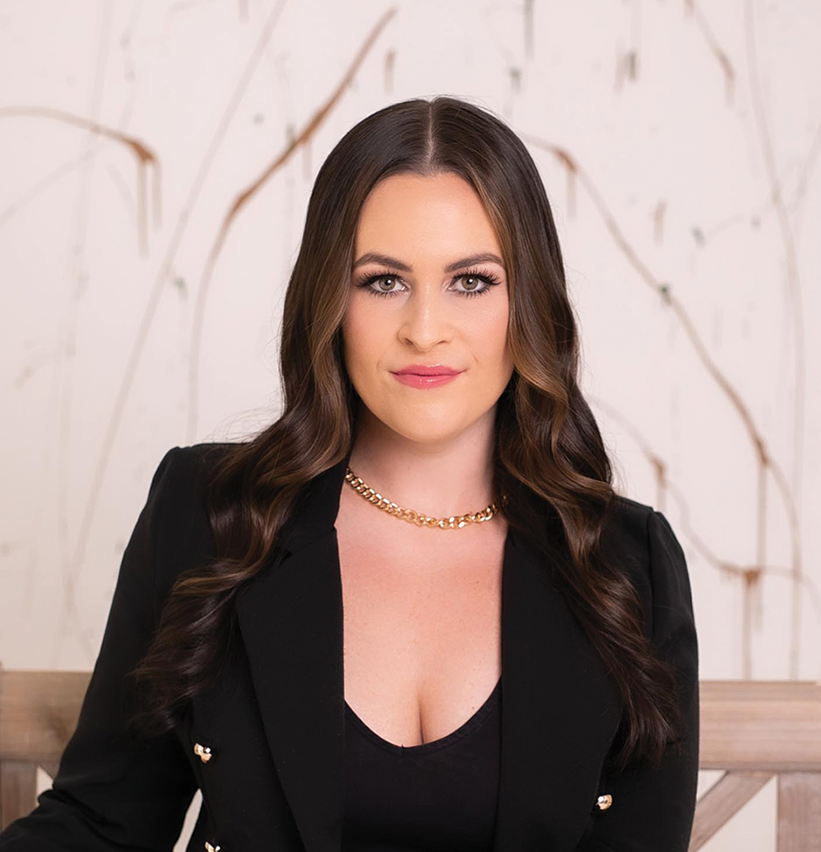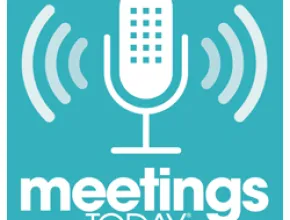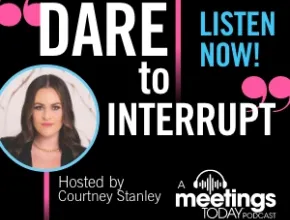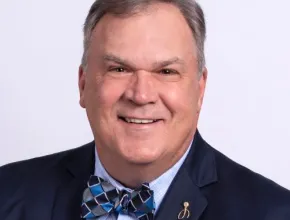It’s All About the Comeback: Catalysing Adversity to Build Something Bigger
Success is not measured by how many times you have been knocked down, but by how many times you get back up.
Industry trailblazers Sarah Soliman Daudin, president and CEO of Soliman Productions, and Carrie Abernathy, founder and executive director of the Association for Women in Events, share how they practiced tenacity in the face of hardship to build something bigger. Listen now.
Want to hear more from Courtney and her incredible guests? Find all Dare to Interrupt episodes here.
Rather read the conversation? See the transcript below:
[Start transcript]
Courtney Stanley: Hi everybody. This is Courtney Stanley, and welcome to another exciting episode of Dare to Interrupt, a listening experience where you have the opportunity to be a fly on the wall and sit in on honest, unfiltered conversations with women who are considered to be the most influential and inspiring leaders in the world of events, hospitality, tourism and beyond.
Throughout their careers, these women have dared to interrupt conversations, their own comfort zones and even sometimes societal norms to hustle toward their greatest levels of success. I’m so excited to introduce you to today’s guests. We have not one but two amazing women here with us. Today we are joined by Sarah Soliman Daudin, President and CEO of Soliman Productions, and Carrie Abernathy, Executive Director of the Association for Women in Events and lead meeting planner for Altria.
Both Sarah and Karen have inspired the world—and me—with their tenacity, their boldness and their ability to build their own empires and businesses, as industry leaders.
Sarah and Carrie, it’s an absolute pleasure having you here with us today.
Carrie Abernathy: I’m so excited to be here. This is Carrie and honored.
Sarah Soliman Daudin: Yes, ditto. This is Sarah. Thank you, Courtney. I’m excited for our conversation today.
Courtney: Me too. I can’t imagine having two more badass women on this podcast. So, it’s a pleasure for me and it’s going to be a really great experience for the audience.
I would love to learn more about both of you, and I’d love to just better understand how each of you got where you are today. So, Carrie, maybe we’ll start with you. Would you mind just telling me a little bit about how you got started in the industry?
Carrie: I would be happy to. It’s a little bit of a long story, so I’m going to try to abbreviate it down a little bit. I was studying psychology at Virginia Tech and was not thinking about hospitality or events. I didn’t even know that you could be a meeting planner. But someone approached me and said, “Have you ever thought about me being a meeting planner? You’re running all of our dorm events. You’re putting together all of our social events in the hall.” And I was like, “No, that’s not a job. That’s not a real thing.” But apparently, it was and is.
So, I decided to change course in my junior year, and I studied abroad in Australia, actually developed a program that hadn’t been developed before for Virginia Tech, and studied overseas for a year in Victoria, Australia. And then came back and graduated and got picked up by a third-party planning company right away. And that’s basically it.
I’ve been in the industry ever since producing military events, medical events. I’ve been in the corporate world and I’m back in the corporate world now. But was in the association world in DC for over 10 years. So, I think I’ve done a little bit of everything at this point.
Courtney: That is wild, I actually had no idea that you studied psychology or that you lived in Australia for a year. Do you find that you’re ever pulling anything from your time as a psychology student and translating it into the field that you work in now?
Carrie: Always. People ask me that all the time. I think I use more psychology than I do, like anything that I learned during like meeting planning classes. I’m always using the psychology side of it, whether it’s during like contract negotiation, or working with speakers or just people in general at events to talk them off the ledge to help people that have anxiety, that are nervous. I mean, I’m always that person that’s their active listener, basically. So, yes, definitely.
Courtney: Yeah, I would think in a world where we’re working so much with people that it would be inevitable not to practice some sort of psychology that you’ve learned before.
Sarah, I know that you and I have spoken a lot about the practice of emotional intelligence, and really, I know that you work with people very closely, interviewing them. And I would love to hear more about how you got your start in the industry and a little bit more about what you’re doing now with your business.
Sarah: Yeah, so how cool is that? I had no idea, Carrie, that you didn’t actually go to school for this because you’re so good at what you do. So, it’s interesting what you can learn about people that you’ve known for so long just through dialogue like this.
But similar to Carrie, I did not know that the events industry was a thing. I went to school for broadcast journalism. So yes, when we talk about interviewing people and that kind of thing, that’s definitely more of my speed. And then I fell into it, much like a lot of us did.
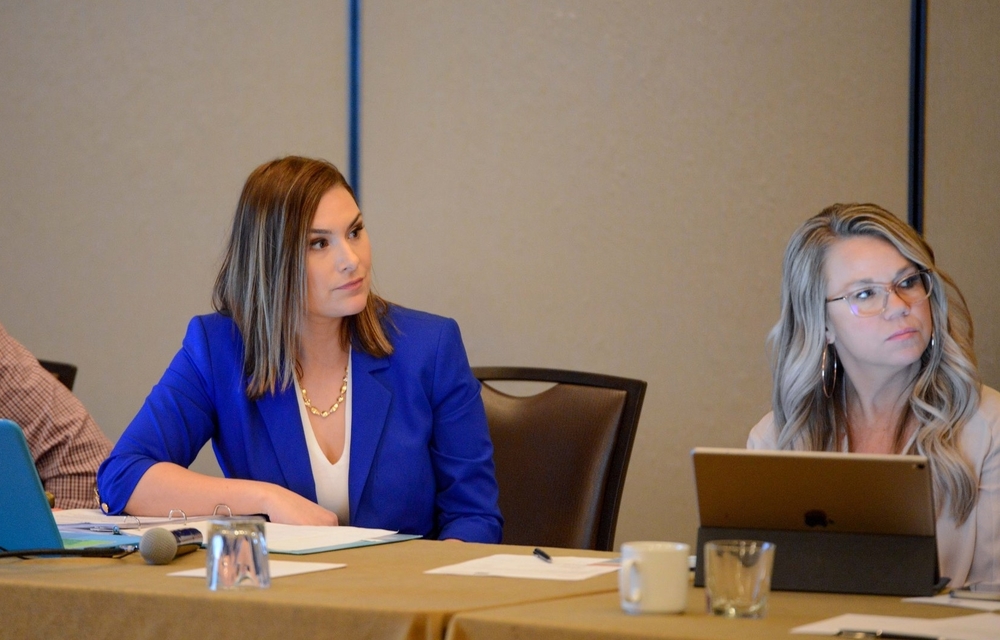
Photo: Carrie Abernathy
I started working for a production company that services the meetings and events industry. And that’s when I got my first taste of events. Now thinking back too, I worked in radio, and obviously in radio, you do a lot of remote events and events in general—concerts, and all of that fun stuff—so, I was always surrounded by events. I just never realized that this was actually an industry that you can tap into.
So, worked for a production company for about four years then got out of that. And I actually was going to step away from the industry when I started my own business and service businesses and individuals that were looking for video content marketing. And then just through the power of relationships, I was pulled back into the meetings and events space, which I’m so grateful for, because I absolutely adore it.
And here I am five years later with Solomon Productions, my own company, and doing a mix of my degree, which is broadcast journalism, but bringing that into the events space by working with associations and corporate groups to help expand their storytelling through video.
So, we’re very much busy, which is a blessing and traveling all over the place, although not at the moment, obviously. But absolutely love what I do. And I cannot imagine another industry to be working in.
Courtney: I totally agree. I absolutely love the fact that our industry is so built on the foundation of relationships and just getting to know people and hear their stories and connect with other people and inspire them. I couldn’t agree more.
Sarah, I have to say—this must come as no surprise to you—but I have been so inspired by you and the business that you’ve created and that you’re running, and I love your team. I would just love to better understand what inspired you to go off on your own and start your own business?
Sarah: Yeah. Most entrepreneurs—they kind of have this personality and this thing growing up or they’re like, ‘I’m going to be my own boss one day.’ I never had that inspiration or even motivation to start my own business until I was made to feel a little uncomfortable in the space that I was in. I just felt icky going to work. I’m sure we’ve all worked for organizations or groups where you just don’t feel like yourself going to work somewhere.
And I told myself, “Well, I have a few options, right? I can just stick it out and hope that that feeling goes away, or I can quit and go work for someone else, or I can quit and try to start my own thing just to see what would happen.”
And it wasn’t until I worked for a small business that I realized, wow, I have a lot of qualities that would be beneficial or would work in a scenario where I would have my own business. So, I kind of learned a lot about myself working for other people. And I saw that I ran their companies the way that I would run my own company.
So, the transition was, okay. Let’s just give it a shot at starting your own business. If worst comes to worse and things do not pick up and you don’t go anywhere, well, I always have—you talked about relationships, Courtney—like those relationships to sustain to fall back on and say, ‘You know what, guys, I tried this whole business ownership thing and it’s just not for me, so I’m ready to explore my opportunities with in another organization.’
Luckily, my story turned out to be that the business took off. I credit that to my team, which you also mentioned. They’re amazing people—super creative and hardworking and just such a good support system for me to be surrounded with every day. With my capabilities and their capabilities together, we’ve been able to create something that continues to grow and be successful. I’m excited to see what the future holds.
So, it’s a lot of work. It’s not for everybody. Business ownership is certainly not for everyone, but it’s something that I learned about myself that ended up being for me, and I just didn’t realize that until later on in my career, which is interesting.
Courtney: I can totally, totally relate to the idea of being at a crossroads. And you find yourself maybe not feeling like you’re able to tap into your potential and really become the person that you could be because you’re maybe working for somebody that it’s just not the right fit. I totally get that.
And I know, Carrie, you started the Association for Women in Events, and really pushed the envelope for the entire meetings and events, and hospitality industry. I would love to hear about maybe that moment that you realized that you had the skill set and the drive and you saw the need to create something new for the industry?
Carrie: Yeah. I don’t think there was a moment. I think it was several moments and a build up over several years, actually. And not once did I think I was the right person to lead that. Honestly, I didn’t think I had the qualifications. I just knew it had to be done.
But I just was searching so long for women-centric resources in the events community, and I just wasn’t finding anything, or I wasn’t finding what I thought were the right things. I was struggling to find mentors. I was frustrated over “manels” as they’re calling them now, I guess, panels of men. And just kind of disappointed in representation in the C-suite in general.
For several years, as a young woman in the events industry, and then in 2014, unfortunately, I was assaulted by a colleague in the events industry. I think that was a tipping point because I had reached out to several groups within the events industry, and I kind of asked for resources and just received no direction from the industry. And I just felt so let down by that moment, that by the next year, I kind of brought together a group of women that were already trying to develop something small in their communities.
I was working with two women that—two other founders—that were doing brunch and learns for women in DC, and then two other women that were doing for senior planners, they were working on kind of a lean in circle.
And I brought them together, and honestly, it just kind of organically fell together that we needed to do something bigger that our little groups here and there weren’t enough, and that I just felt so compelled to push us to that next level, that after that first discovery call and call with the founders, I bought the website, womeninevents.org without even asking anyone else that this was the right thing to do. It just felt like it was the next step.
There had to be a community that needed to be created. And if it didn’t exist, and if no one else would do it, I was the person to do it. It kind of fell on me. So, yeah, it wasn’t like one moment. It was just a lot of buildup and a lot of circumstances that led us here.
Courtney: First of all, I’m so sorry that that happened to you. And secondly, I sincerely and wholeheartedly applaud you for taking something that is terrible and turning it into an opportunity for positive change—not just for you, but for many other people within our community.
I think from my perspective, I mean, I was so excited when I first heard about the Association for Women in Events. And I think that the need for a community that supported women and empowered women, the need for that was so greatly highlighted by the response. There were so many people that were so excited and ready to dive into AWE and connect with other people and feel that support that they needed from a more intimate community.
And I think that’s absolutely incredible, Carrie, that you were able to just take a chance and run with it and build something so impactful. Do you feel like you were able to accomplish what you set out to do by starting AWE a few years back?
Carrie: I think so. I’m really proud of what we’ve done. And it’s definitely grown beyond my wildest dreams. And there are so many amazing things that have come out of it that I didn’t imagine in the beginning.
Like, I started all of this so that there was a community. And then it became a membership organization. And then there were committees, and then we launched the events industry sexual harassment task force with all of the other big leaders in the events world. And then we created amazing content and brought people together through the conference Elevate.
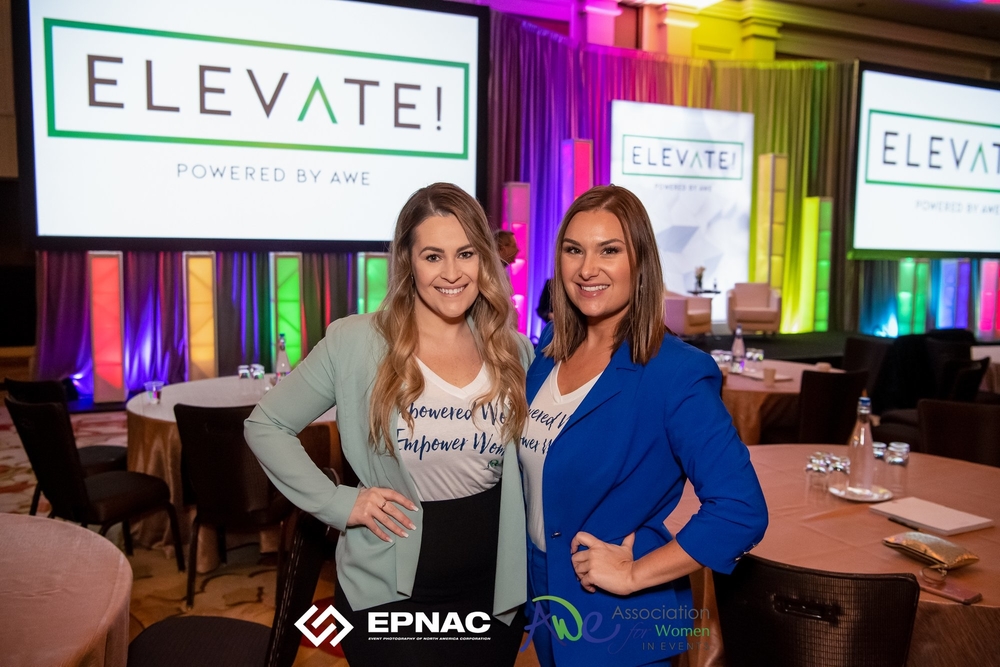
Photo: Courtney Stanley and Carrie Abernathy
I’m just so proud of the work. I don’t think that I ever dreamed that we would be doing this much for the events community. So, it’s been incredible and just more than I could have ever imagined.
Courtney: I’d love to hear more about the events industry sexual harassment task force. I’m cheating a little bit because I am a member of the task force. But I I’d love for you to tell the audience a little bit more about what that is, who’s involved and how they can get involved?
Carrie: Certainly, yeah. I think the vision of this group is just to eradicate completely sexual harassment in the workplace for all of us in the events industry. That’s our mission. That’s our vision. And AWE brought together kind of all of the major power players in the events industry, from PCMH, MPI, to the Events Industry Council... There are so many groups, you’ll have to kind of visit the website, take a look at who’s involved.
But it’s great because once we approached everybody, everybody seemed to be immediately on board. It’s a great thanks to you, Courtney and Sarah, because of the #MeetingsToo, and everything you’re doing in that space. I think that really motivated everybody to get behind the task force. So, congratulations on that and for pushing us to actually put together a group to work on resources around eradication of sexual harassment in the workplace.
So basically, we’re a group that is putting together resources. So, we hold webinars, and we have guest speakers. We also have a pledge that individuals and companies can sign to work to eradicate sexual harassment. And so, I would suggest that everybody visit the website of whatever organization they’re most involved with. You’ll find the pledge on all of those sites, which is really exciting. And yeah, it’s just a really positive thing. And it’s been a really positive experience working together with all of these groups in this community.
Courtney: That’s fantastic to hear. And you’ve mentioned the #MeetingsToo movement, which Sarah and I actually did start a couple years ago now. And again, I’m so proud of the women, like you Carrie, and like you, Sarah, who take a stand and say, ‘These things are happening and it’s not okay. And I’m going to make a change so that other people don’t have to go through what I went through.’
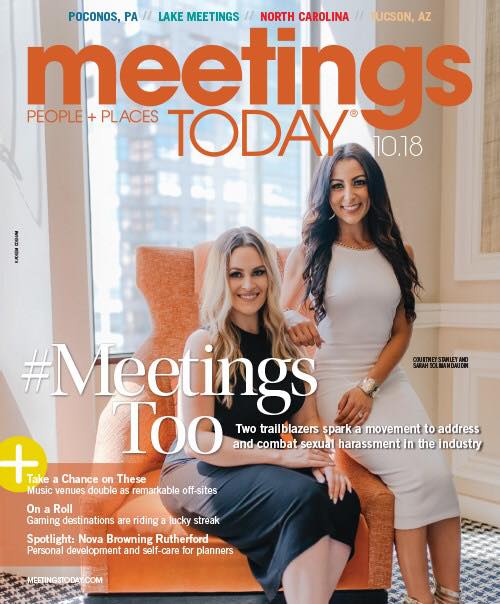 Sarah, maybe you could speak to a little bit about the experience of speaking up about #MeetingsToo and what that was like for you, and your involvement in trying to prevent sexual harassment, or misconduct from happening at meetings and events.
Sarah, maybe you could speak to a little bit about the experience of speaking up about #MeetingsToo and what that was like for you, and your involvement in trying to prevent sexual harassment, or misconduct from happening at meetings and events.
Sarah: Yeah, I think what’s really incredible about this conversation is that I’m realizing that a lot of the impact that we’ve had as women in events has come from uncomfortable places. And, Carrie, you’re starting of AWE, I mean, that was, like you said, a series of events that were uncomfortable for you that led to such an incredible organization that will continue to sustain in its mission, which is to support women in events. And I think that’s phenomenal.
And then Court, with what you and I have been able to accomplish together through #MeetingsToo, I mean, this started, as you know, just from a conversation that two girlfriends were having about sexual harassment and sharing your stories, and it kind of led into, like, what can we do?
I mean, we can sit here and talk it out over drinks, just you and I, or there is more that we can possibly do to create a better future for the next generation—and for the current generation of women who have had to endure sexual harassment in the dark and not have it be a topic of conversation that’s comfortable for everybody.
So, I think with the work that we’ve done through our presentations, creating the dialogue and continuing the dialogue, is something that I am extremely proud of. I think it’s always interesting. We’ve heard all kinds of feedback from people who believe sexual harassment is a problem in our industry to people who don’t. And that is often a very weird discussion to navigate with those individuals.
But I think we’ve always held true to ourselves and held true to our mission and again, the dialogue and the continuous conversations, having the task force and the pledge and all of the supporting organizations in the industry, as Carrie was mentioning, on board with recognizing that this is an issue and continues to be an issue and working together to hopefully eradicate this all together I think is incredibly strong and impactful and I could not be more proud of the efforts that we’ve put forth and will continue to put forth.
Courtney: I think it’s really cool to see what people can do in a massive industry like events just by speaking up. And if you’re listening to this podcast, and you’re one of those people that is incredibly passionate about something that will make the lives of others better, whether it is sexual harassment or other social issues, even though it’s scary and it is uncomfortable to speak up, I mean, I don’t think Courtney and I ever fully are comfortable getting on a stage and talking about sexual harassment.
We always have those butterflies before we get on stage because we just don’t know what kind of feedback or questions we’re gonna get from the audience. But that’s not the point. It’s just fighting through that fear and reminding yourself that the end result is that you are impacting more people in a positive way and not focusing on those that may be hesitant or feeling negative towards your mindset, basically.
I love that you talk about overcoming your fear, or even just setting it aside for the moment and doing what you came there to do. And I also love that you mentioned that it gets a little bit weird when people give you feedback that may be a little bit negative or dismissive when we are trying to overcome that fear and be vulnerable and step on stage and share stories for the betterment of the industry to hopefully prevent terrible things from happening to other people.
I remember, Sarah, I think it was the last time that we presented, there was a woman who approached me in the hallway, and she asked me what the topic of our session was. And I told her it was #MeetingsToo, was teaching the audience about how to prevent sexual harassment from taking place at meetings and events. And she looked at me dead in the eye and she said, “Well, that’s not a problem. I’ve been an HR professional for 20+ years of an association that’s been around for 100+ years and nothing like that has ever been happened.”
And sometimes you can’t argue with people. You can try to educate and have a conversation. But sometimes you just kind of have to accept that people may not believe the same things that you believe. And they may not believe the stories that you tell to be true.
I know that I’ve experienced certain consequences or even backlash from people that I know in the industry or the response hasn’t always been positive when I’ve taken a stand. And I’ve stood up for things that are important to me and I know are important to other people.
So, I’m curious and maybe Carrie, I’ll go to you for this question, but I’m curious, have you experienced any sort of backlash from anybody when you set out on your mission to make a positive impact and to stand up and tell your story?
Carrie: Mm hmm. Yeah, it’s funny. I was just shaking my head behind the scenes for everything that you’ve just mentioned, and Sarah just mentioned because I have so many stories like that. I feel like my entire career in putting AWE together has been based on pushing through those awkward and uncomfortable conversations. And just getting to the next challenge.
Luckily, AWE was met by overwhelming positivity for the most part. But I can draw from several uncomfortable conversations that I had—one, even with one of my mentors in the industry that was male when I brought to him the idea and was excited and we were launching and the board was coming together. And he was like, “But Carrie, there’s already female leadership in the C-suite. This organization isn’t needed.”
I remember feeling so deflated that because he was able to point out one single example of a woman in another organization C-suite that he thought that I felt represented, and he thought that there was no need for a community of women in the events industry.
And I’ve had women, of course, come forward and say, ‘This is great, but men shouldn’t be involved.’ I felt really strongly from the beginning that men should be a part of the solution, that they should be a part of the community. And there were a lot of people who didn’t feel that way. And I wasn’t prepared to meet that head on.
But there were a lot of women that came forward and said, “I’m not going to be a part of this group if there are men involved.” I just really had to kind of put my foot down about my convictions and what I felt was right for the community and have held to it. And I think it’s been really successful. But there have definitely been those conversations.
Courtney: Yeah, it’s interesting that you bring that up, Carrie, because I know that there actually was a member of the AWE community who identifies as male, and he received an award on behalf of his support of AWE. And he actually received quite a bit of backlash and negativity around the fact that a man shouldn’t be winning an award from an association for women.
I thought it was so interesting. I tend to agree with you, Carrie. I think that it’s critical that we have men involved in the conversation, and we have men supporting and advocating for us.
Something that I was really disappointed to hear, and I guess I’m surprised, but I was disappointed to hear that after the #MeToo movement was reignited, and we were having all these conversations, which to me felt like progress, one of the outcomes of the #MeToo movement was that the mentorship between men and women had started to disappear. Men were saying that they felt uncomfortable, that they didn’t want to be accused of anything and that was something that came out of it that wasn’t a positive thing.
And because we know how important it is for men to be involved in the support and empowerment of women, it just was so disappointing to see that.
Sarah, I’m wondering, maybe because I know you feel the same way that Carrie and I do about including men in the conversation—I’m wondering if there’s anything that you would suggest that we could do to help make sure that those relationships between men and women or as a woman, you know, between us and the men that we are surrounded by that inspire us. Is there anything that you feel like we can do to help make sure that men realize that it’s a positive thing to be connecting with women?
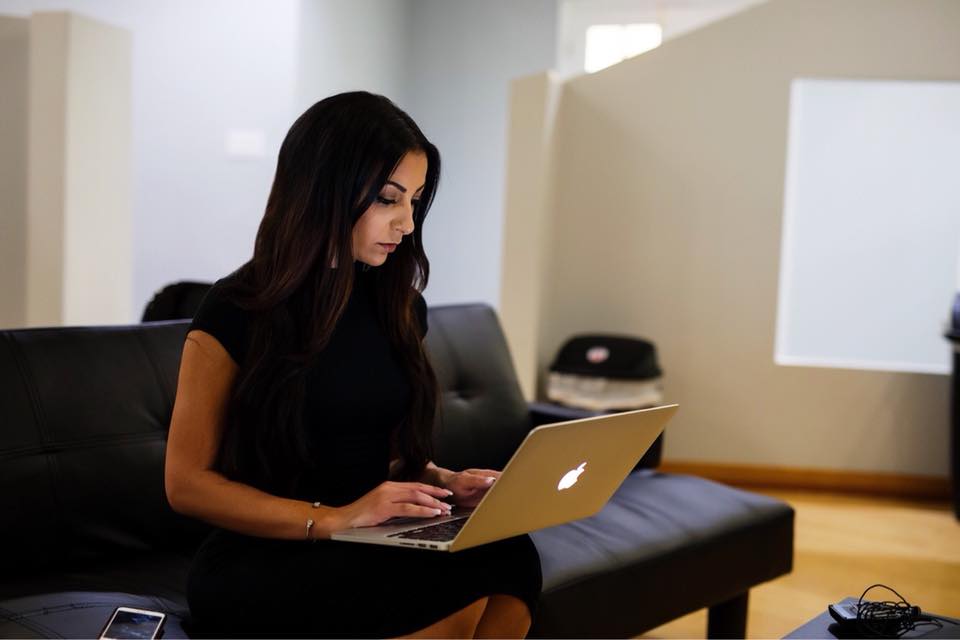
Photo: Sarah Soliman Daudin
Sarah: I think it’s exactly what we’re doing right now. It’s talking about it. It’s having honest dialogue about the fact that they’re necessary to have in the advancement of women. I know when we talk about sexual harassment, there’s a little bit of that fear there. But at the end of the day, when you lay your head down on the pillow at night, if your conscious is clear, then there’s nothing for you to be worried about.
So, for the men that have been involved in AWE or other groups, other discussions about women’s issues and sexual harassment and all of the above, those are men that have nothing to hide, and they want to be a voice of impact and change and progression for women and everyone else in our society.
So, I think it’s exactly what we’re doing now. It’s just maintaining the dialogue, keeping the conversation honest and flowing and inviting men to the table. And I also think that we’ve all had our conversations. Carrie, I know you and I have had many conversations behind the scenes of backlash and negativity that we have received from the industry for various reasons, whether it was first time starting your own business or just people that aren’t appreciative about you having a voice and actually utilizing it the way that you should.
And Court, I know you can relate too. I think we just need to keep trucking in doing exactly what we’re doing. Because at the end of the day, we really are impacting more people in a positive manner and creating a path for that next generation that is a little bit more clear and direct for them to navigate the industry.
I think that it’s okay to not be liked by everybody. That was something that was really hard for me to accept for a long time because I want everyone to like me. But it’s okay to not be like. And I think that’s kind of the stage that the three of us have probably hit is, you know what, we’re not going to be everyone’s cup of tea, and that is okay. Maybe we’re for the coffee drinkers, you know what I mean?
Like it’s okay. It’s okay to not be liked and to still sustain and be fierce in your message and what you stand for. So, yeah, I mean, I, you know, I am extremely proud, like I said before, of what we’ve been able to accomplish and the fact that we just keep going.
Courtney: I think it’s so important, first of all, to call out that, yes, there are always going to be haters. Haters gonna hate, and you just have to keep doing what you were set out to do in the beginning. But I also think it’s important to know, and this is from my perspective, so I am the same way. I am a people pleaser. I like to be liked. I mean, who doesn’t right? And it is difficult when you know that people aren’t feeling you, when you know that people are talking crap about you, when you know that people aren’t supporting you and may actually be trying to take you out in a way because they just don’t like you that much.
It’s tough. And for me, I adopt the same mentality and honestly, I forced myself to adopt that mentality. It’s not natural for me to feel like I can just ignore the haters and move forward. For me, my heart just breaks, and I want so badly to connect with people and unite and make them see that I’m trying to do a good thing, and I’m trying my best.
But there comes a point where I have to let it go. And I have to just push forward, and it does hurt and I am human. And I think you two would agree that you don’t go unaffected by conversations that are negative. They do hurt, and you have to just push forward and surround yourself with positive people.
Sarah: I was just gonna say I also think that’s when emotional intelligence comes into play. And it’s really being selective with the battles that you choose to fight, and then more importantly, where you where you invest your energy is extremely important, but then also finding compassion for those that may disagree with you on certain things or may not like you. I mean, that always comes from a deeper place.
So, I have learned—and it’s not natural for me either—but I’ve learned to exercise my emotional intelligence and remind myself, it’s not actually you. This is this is something deeper on the other end. And it’s up to me to show that compassion and just extend a hand where and when I can until those folks see that, okay, maybe she’s not so bad after all.
Courtney: I completely agree. And I think that’s part two to the process. Part one, let yourself feel those feels. It hurts. It sucks. But part two is moving forward. And I totally agree. And I think I got this from my parents, growing up with my parents telling me that everybody has a story, and everybody has things that they’ve gone through that makes them the way that they are. And it is using that compassion and extending grace to those that maybe you just don’t understand, and they don’t understand you to move forward and except that you’re doing the best that you can. And they’re probably doing the best that they can to.
Carrie: Yeah, I’m shaking my head here. You can’t see me. But I’m wholeheartedly agreeing because your stories are my stories. Like I have the exact same experiences where in this industry, I think we’re all people pleasers, right? So, I’m the same way. Like it totally breaks me down. I totally try not to let it break me down. But I think I learned this in kindergarten, “Kill them with kindness.” I don’t think they said it like that. But that’s basically the lesson is... for me, our mission is to elevate women.
Bottom line, that is such a positive thing. There is no way anyone can break that down to make that a negative. No matter what people say, no matter what people do, as long as that is my mission, and that’s what I keep putting out to the planet and the world, in the events industry, then I know that I’m doing the right thing. And like I said, we’re not everybody’s cup of tea, which totally affects us. But at the end of the day, we’re doing what we feel is right and bringing positivity to the world. So, I don’t know how anyone could tear that down.
Courtney: Well, and from my perspective, you both are women who have made such a positive impact on the community, people look to you as businesswomen with integrity. And I think that the path that you’ve chosen and the behaviors that you have applied to the way that you do business, the way that you build relationships and the way that you want your legacy to be built, I think it speaks volumes to the reputation that you’ve created for yourselves. I would love to end this episode with just hearing a piece of final advice from each of you. So, Carrie, we’ll start with you.
Carrie: Yeah, there’s so much advice that I could get it. Let’s see. I think my favorite piece of advice and just my favorite motto in general is that other women are not your competition. Let’s be kind to each other. There are spaces at the board table for everyone. I hope that the last five years of the Association for Women in Events and the #MeetingsToo movement and everything we’ve done to create a space for women at the table just shows everyone that there’s room for everyone.
And make time for each other and make time for mentorship and being a mentee and being a mentor in the industry. And bottom line, it’s just a lot of hard work. Sarah and I kind of grew up in this industry together, in the meetings world together, and she’s a total professional and rock star, and I think that she’d be the first person to agree that as an entrepreneur, you’re never working for yourself.
You’re always working for other people, and you’re always on, and always working and she’s such a hard worker. And sometimes you just have to put that hard work in. And if you do, and if you’re positive, you’ll get there, and you’ll make it. So, I think that’s it for me.
Courtney: If I could applaud and cheer into my microphone without breaking the episode, I would. I totally agree. There’s enough room for everybody to succeed. Sarah, what about you? What would your final piece of advice be to the audience today?
Sarah: Yeah, thank you, Carrie. That was such a sweet compliment. I totally feel the same way about you. It’s definitely hard work. And to echo Carrie, I would also say, don’t be so hard on yourself. I know that we tend to be our worst critic. And the goal is to constantly improve day-in-and-day-out for yourself and for those around you.
But as women, I find that we are a little bit too harsh on ourselves, and it’s okay to have bad days, and it’s okay to own them, and then it’s okay to put your hair up and red lipstick on and go out and conquer the world the next day.
So, just find your happy place, be true to yourself, find your voice and use it. So, don’t sit back. If you find that you are ready to take on a leadership role or do something that’s outside of your comfort zone, like apply for a board position as Carrie said, there is room at the table.
Don’t wait for anyone to extend the chair. As I always say, build your own table, pull up your own chair and just have at it. So, that would be my advice.
Courtney: That’s great advice, Sarah. I think being kind to yourself and understanding that not every day is going to be great. You’re going to have bad days. You’re going to have good days and everything in between. And I think that’s especially relevant now in the world that we’re living in, being in quarantine, and with people struggling so much financially and with health issues as well, it’s a lot to balance right now. I think those are the words that people need to hear and need to remember.
So, thank you both so much, Sarah and Carrie. It has been a true pleasure and honor having you as guests on Dare to Interrupt today. And thank you all for listening. Make sure that you never miss an episode by subscribing to dare to interrupt on Apple podcasts on Spotify, Stitcher, Google Play and more. Stay bold, stay tenacious and stay daring, my friends. Until next time.
[End transcript]
Listen to more Dare to Interrupt:
- Episode 1: Embracing Fear and Bossing Up
- Episode 2: Fill Up Your Tank and Keep Your Foot On the Gas
- Episode 3: Courage, Commitment and Character: Choosing a Warrior Mentality and the Will to Win
- Episode 5: Inclusion is the Driver of Innovation
- Episode 6: Communicating Like a Boss
- Episode 7: Speaking Up, Office Politics, and Unapologetic Ambition
About our guests:
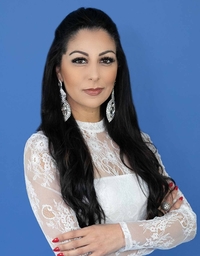 Sarah Soliman Daudin, President & CEO, Soliman Productions
Sarah Soliman Daudin, President & CEO, Soliman Productions
With over a decade of experience in production, Sarah Soliman Daudin brings her expertise into her own company, Soliman Productions working with associations worldwide as a visual storyteller to capture compelling video content.
Sarah has been recognized for her work in the industry by several industry organizations. In 2014, she won IAEE’s Rookie of the Year Award. In 2018, Sarah was honored with the Rising Star Award for Q2 of 2018 by the MPI Greater Orlando Chapter and also recognized as a Rising Star by Meetings and Conventions in 2019. She is a recipient of the 2019 Smart Women in Meetings Entrepreneur Award. In 2018, Sarah was named a finalist for the Emerging Leader Award by the Association For Women In Events. Sarah's passion for the industry is also seen in her volunteerism. She served as Co-Chair for the MPI Women's Advisory Board. She also serves as the Vice Chair of Chapters on the MPI Global Board of Trustees and is the Incoming President of the MPI Greater Orlando Chapter.
Her passion for the industry is also reflected through important industry issues including sexual harassment in the meetings and events space, working to educate and execute preventative measures meeting professionals can pro-actively implement into their contingency plans. Her work in the #MeetingsToo movement alongside her colleague Courtney Stanley earned her recognition on the cover of Meetings Today in October 2018.
Sarah hopes to continue inspiring and educating meeting professionals in all facets of their career through various initiatives she finds great passion in.
Connect with Sarah on social media:
- Instagram: @sarahsolimandaudin
- Twitter: @SarahMSoliman
* * *
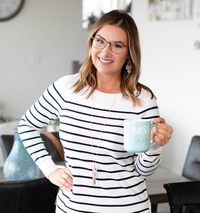 Carrie Abernathy, Executive Director, Association for Women in Events and Lead Meeting Planner, Altria
Carrie Abernathy, Executive Director, Association for Women in Events and Lead Meeting Planner, Altria
Carrie Abernathy, CMP, CEM, CSEP, is Co-Founder and volunteer Executive Director of the Association for Women in Events. Carrie is also Lead Meeting Planner, for the Industry Engagement team at Altria Group Distribution Company. For 15 years she has enjoyed working in the meetings/events world and connecting with others.
Carrie has served on several advisory councils and committees to include: PCMA’s Emerging Leaders Committee, Cleveland CVB Advisory Board, Team San Jose Advisory Council, Reno-Tahoe Advisory Board, Salt Lake City Advisory Council, Destination Hotels Advisory Council, Green Meetings Industry Council Foundation (Chair- 2014/2015). She has also received several industry accolades and was named Collaborate Magazine’s “40 under 40” industry planners to watch. She was also named Smart Meetings Magazine’s Top 50 Smart Women of 2017 and inducted into their Hall of Fame in 2019. That year she was named Successful Meetings Magazine’s “Top 25 Most Influential” in the meetings industry as well. Carrie has been a finalist for the prestigious “Meeting Planner of the Year” honor for PCMA.
Carrie splits her time between Denver and Virginia with her min pin Ginger, and you’ll often find her golfing in the summer and skiing in the winter.
Connect with Carrie on social media:
- Instagram: @wine.golf.denvergirl
- Twitter: @CAbernathy
* * *
About our host Courtney Stanley:
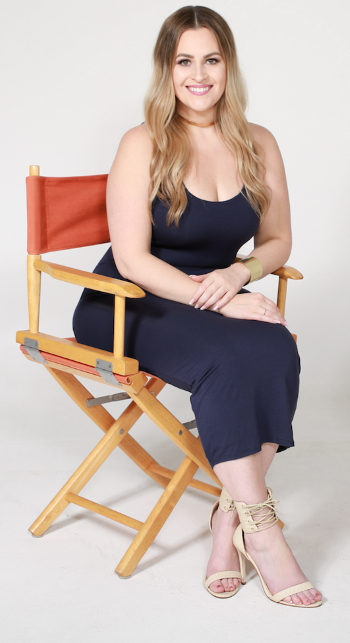 Courtney is a keynote speaker, writer, podcaster and career success coach with a background in experience design, community engagement and leadership development. Courtney is the host of Meetings Today’s “Dare to Interrupt,” a podcast that provides a platform for the event, hospitality and tourism industry’s most influential and successful women to share their stories of adversity and success, unfiltered.
Courtney is a keynote speaker, writer, podcaster and career success coach with a background in experience design, community engagement and leadership development. Courtney is the host of Meetings Today’s “Dare to Interrupt,” a podcast that provides a platform for the event, hospitality and tourism industry’s most influential and successful women to share their stories of adversity and success, unfiltered.
Courtney believes that transforming past experiences into impactful conversations through raw, authentic storytelling challenges the status quo, connects people from all walks of life and results in great change for the world.
- Courtney is the youngest member to have ever been elected to Meeting Professionals International’s (MPI) International Board of Directors
- She is the recipient of Smart Meetings’ Entrepreneur Award, MeetingsNet’s Changemaker Award, the Association for Women in Events (AWE) Disruptor Award, the MPI Chairman’s Award and MPI RISE Award.
- Named Collaborate and Connect Magazine’s 40 under 40 and a Meetings Today Trendsetter.
- Recognized as one of the event industry’s most impactful change-makers.
- Serves on the Events Industry Sexual Harassment Task Force, AWE’s Board of Directors, MPI’s Women’s Advisory Board, is a Meetings Mean Business Ambassador and is the co-founder of the award-winning movement, #MeetingsToo.
How to connect with Courtney:
- Instagram: @courtneyonstage
- Twitter: @courtneyonstage
- Facebook: courtneyonstage
- Website: www.courtney-stanley.com


